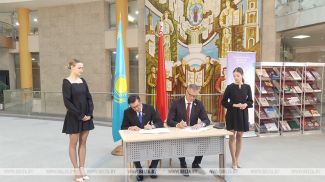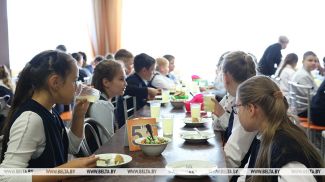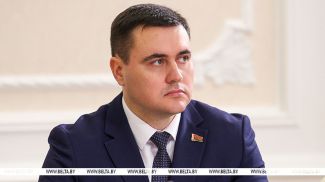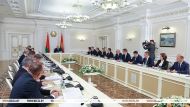The international conference “European Quality of Distance Education” that took place at the end of November brought together representatives of educational institutions, business communities and recruiting firms from the CIS and Europe. Top on the agenda was distance learning, quality management of distance education, improvement of access to European education and Belarus' access to the international market of education services. Logically enough, the conference was hosted by the Belarusian State University of Informatics and Radioelectronics (BSUIR), the country's leader in distance learning. Co-chairman of the conference, BSUIR First Prorector Anatoly Osipov tells BelTA about the prospects of distance learning in Belarus and the way it can boost the export of Belarus' education services, as well as joint projects with foreign partners
Mr Osipov, e-learning is getting increasingly popular today. Online education programs are available across a broad range of disciplines. What is distance learning for conventional educational institutions: a rival or an ally?
First of all, I would like to say that one should not be afraid of new forms of education. The world is changing fast and the education sector needs to adjust. Distance learning is objectively a very strong trend today.
This form of education has been gaining ground fast; new online courses are offered every day. Online educational programs account for some 80% of advanced training and retraining programs. Bruce Bucknell, Ambassador Extraordinary and Plenipotentiary of Great Britain and Northern Ireland to Belarus, who took part in the opening of the conference, was not embarrassed to admit that he uses online courses to get additional knowledge and that improves his Russian language skills using Skype.
Many universities set up associations to promote a new format of education. Distance learning covers a great number of students; special programs are developed to accommodate this type of education.
For example, Russia has been actively promoting online programs. We are also aware that distance learning programs are essential to the success of the University.
Back in 2001, the BSUIR began to develop this form of education. It was absolutely the right decision. Distance education benefits our state, and allows the University to offers its educational programs both to domestic and foreign students.
How widely does the BSUIR use distance learning?
The University constantly introduces new technologies that enable students to choose various educational programs. We have set up the department of continuing and distance education where disciplines are taught in English. Using distance learning technologies this department provides full-time and part-time students with the opportunity to study some individual courses.
Of course, in disciplines that involve the knowledge-based equipment, training is face-to-face. This training cannot be conducted distantly. But at the same time, we are offering more opportunities for distance education in professions related to information technology. This is what a student can learn using a computer with the help of special training programs.
The use of distance programs makes it much easier for the University to advance to the international market of education services. For example, in 2013, the University signed a cooperation agreement with the American Computer System Institute (CSI) to provide education services to the residents of the United States under the integrated "bachelor", "specialist" and "master" programs.
The Department of Information and Computer Systems has opened branches at the CSI in Chicago and Boston. In the autumn of 2013 first ten American students started training under the program "Programmed mobile systems” at the Chicago branch. In 2014 we offered the new programs "Information systems and technology (in business management)" in the United States.
The project offers blended learning. Our cooperation with the American side, however, would be impossible without this online learning and information technology.
Such projects benefit both the university and the country in general, enhance the prestige of the national education system. Moreover, they improve the quality of education as the curriculum is constantly updated through the introduction of new solutions and methods.
How do you assess the quality of online education in general? It is not a secret that many are reluctant to trust this form of education. Distance education is often associated with lower quality compared to education gained in classrooms.
Any form of education should provide every opportunity to obtain quality theoretical knowledge and hands-on skills, be it full-time, part-time, or online education.
The difference should not be in the quality but the format of education which can offer online courses, face-to-face meetings or blended learning. It is up for a student to choose.
Students themselves should be interested in quality education. Today the first question they face in a job interview is what they can do and how good they are at it, not about the form of education they received.
Today there is a great variety of online courses of different complexity levels and quality. Certificates or diplomas that some of them offer are recognized almost by every company and firm. But there are online courses that lack proper control.
One should know how to differentiate between such types of online courses and choose the ones that secure high quality of education.
Now we are coming to the question of practical skills. Matching education and labor market needs has been an issue of heated debate all over the world and Belarus as well. How are BSUIR graduates doing on this front?
Practice-oriented training is one of the fundamental principles of our education process. Moreover, we provide different levels of training.
The first level is carried out at our subsidiaries, academic divisions at the leading Belarusian enterprises. For example, we operate such divisions at the companies Planar and EPAM Systems. The second level is represented by well-equipped joint laboratories of the BSUIR and the leading Belarusian companies. The laboratories offer not only traditional lectures, but also seminars organized by these very companies. As a result, when our graduates start working for these particular companies, they already know the technologies the companies use.
The third level includes training centers of Microsoft, IBM, SAP, National Instruments, Cisco Networking Academy, and others that provide training according to the programs of these top world companies. Our students can get certificates of these centers in addition to their university diplomas, which makes them more competitive in the labor market. Finally, the fourth level is represented by the student business incubator where young people can test their ideas and implement them into practice.
All these levels of education are aimed at the development of practical skills of the future specialists.
The BSUIR is actively developing distance education programs that open up great opportunities for joint double-degree projects allowing students to simultaneously attend two universities and get two degrees at once. How much is the university interested in such projects?
Double-degree education is quite a promising tool for enhancing the attractiveness of universities and expanding the export of education services.
Thanks to the quality of Belarusian IT training hailed in many countries worldwide, this cooperation is very promising for us.
Therefore, the University is mulling over the possibility to implement various joint projects of this kind with foreign partners.
For example, in autumn representatives of the British business school Magna Carta College Oxford met with international students attending our university. Attendees were told that distance learning gives an opportunity to get a second higher education with a mutual recognition of credits received at the Belarusian university.
It may help our University increase the number of international students who will have a chance to do two degrees and get two diplomas at the same time.
Our University and Magna Carta College Oxford Business School are in talks over joint projects regarding joint master's programs and training of world-class professionals.
On the whole, such cooperation between the education systems generates positive results in many areas. First, it makes our education more prestigious. Second, our education can be easily integrated into the global education network.
Mr Osipov, e-learning is getting increasingly popular today. Online education programs are available across a broad range of disciplines. What is distance learning for conventional educational institutions: a rival or an ally?
First of all, I would like to say that one should not be afraid of new forms of education. The world is changing fast and the education sector needs to adjust. Distance learning is objectively a very strong trend today.
This form of education has been gaining ground fast; new online courses are offered every day. Online educational programs account for some 80% of advanced training and retraining programs. Bruce Bucknell, Ambassador Extraordinary and Plenipotentiary of Great Britain and Northern Ireland to Belarus, who took part in the opening of the conference, was not embarrassed to admit that he uses online courses to get additional knowledge and that improves his Russian language skills using Skype.
Many universities set up associations to promote a new format of education. Distance learning covers a great number of students; special programs are developed to accommodate this type of education.
For example, Russia has been actively promoting online programs. We are also aware that distance learning programs are essential to the success of the University.
Back in 2001, the BSUIR began to develop this form of education. It was absolutely the right decision. Distance education benefits our state, and allows the University to offers its educational programs both to domestic and foreign students.
How widely does the BSUIR use distance learning?
The University constantly introduces new technologies that enable students to choose various educational programs. We have set up the department of continuing and distance education where disciplines are taught in English. Using distance learning technologies this department provides full-time and part-time students with the opportunity to study some individual courses.
Of course, in disciplines that involve the knowledge-based equipment, training is face-to-face. This training cannot be conducted distantly. But at the same time, we are offering more opportunities for distance education in professions related to information technology. This is what a student can learn using a computer with the help of special training programs.
The use of distance programs makes it much easier for the University to advance to the international market of education services. For example, in 2013, the University signed a cooperation agreement with the American Computer System Institute (CSI) to provide education services to the residents of the United States under the integrated "bachelor", "specialist" and "master" programs.
The Department of Information and Computer Systems has opened branches at the CSI in Chicago and Boston. In the autumn of 2013 first ten American students started training under the program "Programmed mobile systems” at the Chicago branch. In 2014 we offered the new programs "Information systems and technology (in business management)" in the United States.
The project offers blended learning. Our cooperation with the American side, however, would be impossible without this online learning and information technology.
Such projects benefit both the university and the country in general, enhance the prestige of the national education system. Moreover, they improve the quality of education as the curriculum is constantly updated through the introduction of new solutions and methods.
How do you assess the quality of online education in general? It is not a secret that many are reluctant to trust this form of education. Distance education is often associated with lower quality compared to education gained in classrooms.
Any form of education should provide every opportunity to obtain quality theoretical knowledge and hands-on skills, be it full-time, part-time, or online education.
The difference should not be in the quality but the format of education which can offer online courses, face-to-face meetings or blended learning. It is up for a student to choose.
Students themselves should be interested in quality education. Today the first question they face in a job interview is what they can do and how good they are at it, not about the form of education they received.
Today there is a great variety of online courses of different complexity levels and quality. Certificates or diplomas that some of them offer are recognized almost by every company and firm. But there are online courses that lack proper control.
One should know how to differentiate between such types of online courses and choose the ones that secure high quality of education.
Now we are coming to the question of practical skills. Matching education and labor market needs has been an issue of heated debate all over the world and Belarus as well. How are BSUIR graduates doing on this front?
Practice-oriented training is one of the fundamental principles of our education process. Moreover, we provide different levels of training.
The first level is carried out at our subsidiaries, academic divisions at the leading Belarusian enterprises. For example, we operate such divisions at the companies Planar and EPAM Systems. The second level is represented by well-equipped joint laboratories of the BSUIR and the leading Belarusian companies. The laboratories offer not only traditional lectures, but also seminars organized by these very companies. As a result, when our graduates start working for these particular companies, they already know the technologies the companies use.
The third level includes training centers of Microsoft, IBM, SAP, National Instruments, Cisco Networking Academy, and others that provide training according to the programs of these top world companies. Our students can get certificates of these centers in addition to their university diplomas, which makes them more competitive in the labor market. Finally, the fourth level is represented by the student business incubator where young people can test their ideas and implement them into practice.
All these levels of education are aimed at the development of practical skills of the future specialists.
The BSUIR is actively developing distance education programs that open up great opportunities for joint double-degree projects allowing students to simultaneously attend two universities and get two degrees at once. How much is the university interested in such projects?
Double-degree education is quite a promising tool for enhancing the attractiveness of universities and expanding the export of education services.
Thanks to the quality of Belarusian IT training hailed in many countries worldwide, this cooperation is very promising for us.
Therefore, the University is mulling over the possibility to implement various joint projects of this kind with foreign partners.
For example, in autumn representatives of the British business school Magna Carta College Oxford met with international students attending our university. Attendees were told that distance learning gives an opportunity to get a second higher education with a mutual recognition of credits received at the Belarusian university.
It may help our University increase the number of international students who will have a chance to do two degrees and get two diplomas at the same time.
Our University and Magna Carta College Oxford Business School are in talks over joint projects regarding joint master's programs and training of world-class professionals.
On the whole, such cooperation between the education systems generates positive results in many areas. First, it makes our education more prestigious. Second, our education can be easily integrated into the global education network.













